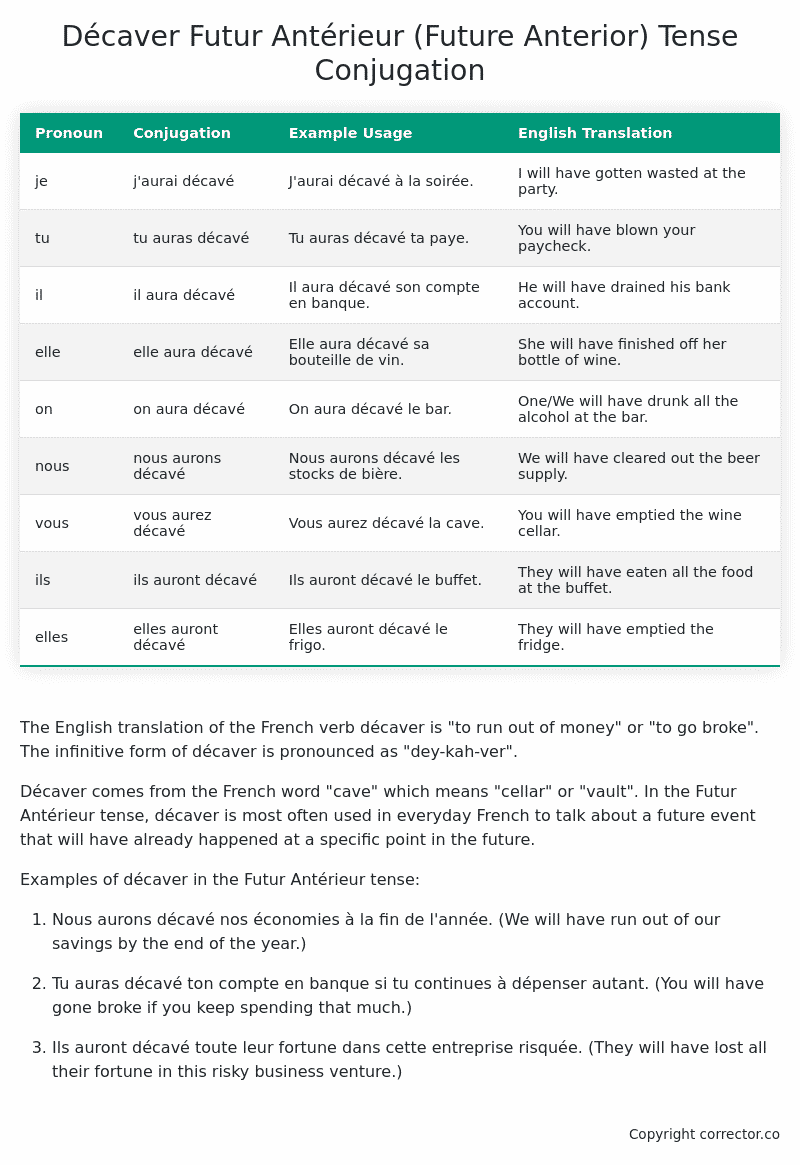Futur Antérieur (Future Anterior) Tense Conjugation of the French Verb décaver
Introduction to the verb décaver
The English translation of the French verb décaver is “to run out of money” or “to go broke”. The infinitive form of décaver is pronounced as “dey-kah-ver”.
Décaver comes from the French word “cave” which means “cellar” or “vault”. In the Futur Antérieur tense, décaver is most often used in everyday French to talk about a future event that will have already happened at a specific point in the future.
Examples of décaver in the Futur Antérieur tense:
-
Nous aurons décavé nos économies à la fin de l’année. (We will have run out of our savings by the end of the year.)
-
Tu auras décavé ton compte en banque si tu continues à dépenser autant. (You will have gone broke if you keep spending that much.)
-
Ils auront décavé toute leur fortune dans cette entreprise risquée. (They will have lost all their fortune in this risky business venture.)
Table of the Futur Antérieur (Future Anterior) Tense Conjugation of décaver
| Pronoun | Conjugation | Example Usage | English Translation |
|---|---|---|---|
| je | j’aurai décavé | J’aurai décavé à la soirée. | I will have gotten wasted at the party. |
| tu | tu auras décavé | Tu auras décavé ta paye. | You will have blown your paycheck. |
| il | il aura décavé | Il aura décavé son compte en banque. | He will have drained his bank account. |
| elle | elle aura décavé | Elle aura décavé sa bouteille de vin. | She will have finished off her bottle of wine. |
| on | on aura décavé | On aura décavé le bar. | One/We will have drunk all the alcohol at the bar. |
| nous | nous aurons décavé | Nous aurons décavé les stocks de bière. | We will have cleared out the beer supply. |
| vous | vous aurez décavé | Vous aurez décavé la cave. | You will have emptied the wine cellar. |
| ils | ils auront décavé | Ils auront décavé le buffet. | They will have eaten all the food at the buffet. |
| elles | elles auront décavé | Elles auront décavé le frigo. | They will have emptied the fridge. |
Other Conjugations for Décaver.
Le Present (Present Tense) Conjugation of the French Verb décaver
Imparfait (Imperfect) Tense Conjugation of the French Verb décaver
Passé Simple (Simple Past) Tense Conjugation of the French Verb décaver
Passé Composé (Present Perfect) Tense Conjugation of the French Verb décaver
Futur Simple (Simple Future) Tense Conjugation of the French Verb décaver
Futur Proche (Near Future) Tense Conjugation of the French Verb décaver
Plus-que-parfait (Pluperfect) Tense Conjugation of the French Verb décaver
Passé Antérieur (Past Anterior) Tense Conjugation of the French Verb décaver
Futur Antérieur (Future Anterior) Tense Conjugation of the French Verb décaver (this article)
Subjonctif Présent (Subjunctive Present) Tense Conjugation of the French Verb décaver
Subjonctif Passé (Subjunctive Past) Tense Conjugation of the French Verb décaver
Subjonctif Imparfait (Subjunctive Imperfect) Tense Conjugation of the French Verb décaver
Subjonctif Plus-que-parfait (Subjunctive Pluperfect) Tense Conjugation of the French Verb décaver
Conditionnel Présent (Conditional Present) Tense Conjugation of the French Verb décaver
Conditionnel Passé (Conditional Past) Tense Conjugation of the French Verb décaver
L’impératif Présent (Imperative Present) Tense Conjugation of the French Verb décaver
L’infinitif Présent (Infinitive Present) Tense Conjugation of the French Verb décaver
Struggling with French verbs or the language in general? Why not use our free French Grammar Checker – no registration required!
Get a FREE Download Study Sheet of this Conjugation 🔥
Simply right click the image below, click “save image” and get your free reference for the décaver Futur Antérieur tense conjugation!

Décaver – About the French Futur Antérieur (Future Anterior) Tense
Construction
Common Everyday Usage Patterns
Interactions with Other Tenses
For example
Summary
I hope you enjoyed this article on the verb décaver. Still in a learning mood? Check out another TOTALLY random French verb conjugation!


